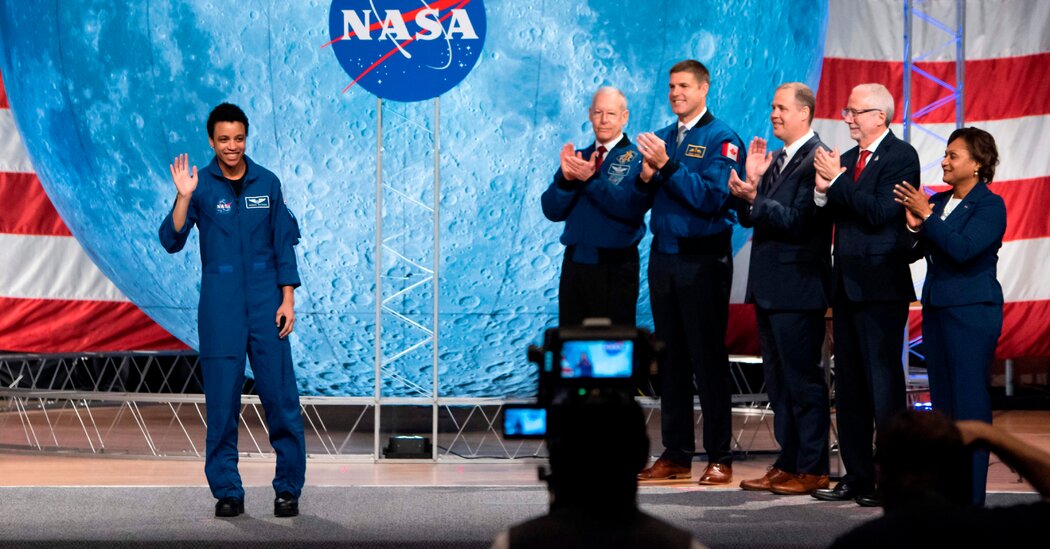Two decades after the International Space Station became humanity’s long-lasting home in orbit, Jessica Watkins, a NASA astronaut, is poised to become the first Black woman to join its crew for a long-term mission.
NASA announced on Tuesday that Dr. Watkins, a geologist raised in Lafayette, Colo., would serve as a mission specialist on SpaceX’s next astronaut flight, known as Crew-4, to the space station. She will join two other NASA astronauts and an Italian astronaut for a six-month mission aboard the orbital lab that is scheduled to start in April.
In an interview, Dr. Watkins said she hoped going to the space station would set an example for children of color, and “particularly young girls of color, to be able to see an example of ways that they can participate and succeed.”
She added, “For me, that’s been really important, and so if I can contribute to that in some way, that’s definitely worth it.”
Only seven of the 249 people who have boarded the space station since its creation in 2000 were Black. Victor Glover, a Navy commander and test pilot who joined NASA’s astronaut corps in 2013, became the first Black crew member in a regular long-duration mission at the station; his mission started last year. The six Black astronauts who had visited the space station before Mr. Glover were part of space shuttle crews that stayed for roughly 12 days.
In 1983, Guion S. Bluford became the first Black American to go to space, and Mae Jemison was the first Black woman to do so, in 1992. In 1961, Ed Dwight, an Air Force pilot, was NASA’s first Black astronaut trainee, but he was not selected. In September, Sian Proctor, a member of SpaceX’s Inspiration4 amateur astronaut mission that went to orbit but not to the space station, became the first Black woman to serve as a spacecraft pilot.
Jeanette Epps, a NASA astronaut, was initially set to be the first Black woman to live and work on the space station, in 2018. But she was replaced by another astronaut for reasons NASA has not explained. She remains scheduled for a six-month mission as part of the first operational astronaut crew to fly Boeing’s Starliner capsule to the station. But development of that capsule is years behind schedule. This summer, a faulty set of valves discovered on Starliner’s propulsion system before an uncrewed test launch further delayed Dr. Epps’s mission to late 2022 at the earliest.
Dr. Watkins completed her undergraduate studies at Stanford University and earned a doctorate from the University of California, Los Angeles, with a study of landslides on Mars and Earth. She has worked with NASA’s science labs, on projects including the Mars Curiosity rover mission, and joined the astronaut corps in 2017. Becoming an astronaut, she said, was “something I dreamed about for a very long time ever since I was pretty little, but definitely not something I thought would ever happen.”
Last year, she was among 18 astronauts NASA named to represent the agency’s Artemis program, a multibillion-dollar effort to return humans, including the first woman and the first person of color, to the surface of the moon in 2025. The astronauts NASA sent to the moon during the Apollo program were all white men. In recent years, the agency has sought to make its astronaut programs more representative of the American population.
“Exploring space beyond L.E.O. is a huge effort, and we have to have the participation from all parts of our society,” Ken Bowersox, a senior official in NASA’s space operations wing and a former astronaut, said during an event last week, referring to the agency’s goals beyond low-Earth orbit.
Dr. Watkins had been training for a trip to space for months before her crew assignment. She has completed spacewalk simulations at NASA’s Johnson Space Center in Houston and learned the ins and outs of the space station, a football-field-size science laboratory 260 miles above Earth.
“It is certainly not lost on me that we’ve arrived in this moment in history,” she said of being the first Black woman to carry out a long-duration mission. “This moment is not as worthwhile if we are not able to focus on the job and perform well.”





